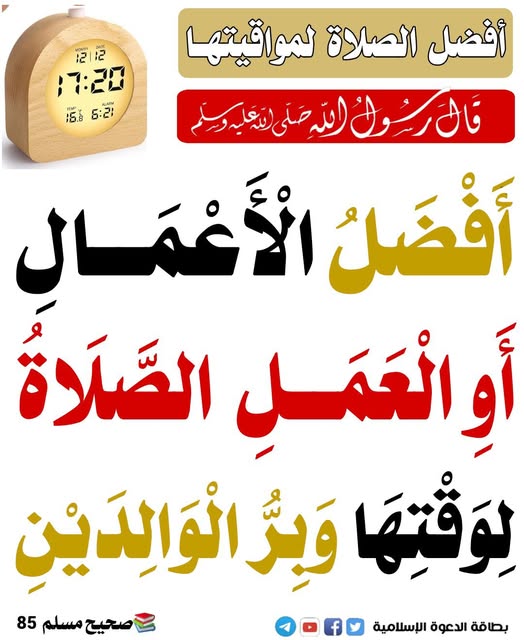Al Kareem Mosque
Chapter: Salah ( الصلاة )
The first deed for which a servant will be held accountable on the Day of Resurrection
اَبِيْ هُرَيْرَةَ رَضِيَ اللهُ عَنْهُ قَالَ : قَالَ رَسُوْلُ اللهِ صَلَّي اللهُ عَلَيْهِ وَ سَلَّمَ
إنَّ أوَّلَ ما يُحَاسَبُ به العبدُ يومَ القيامةِ مِن عملِهِ صلاتُهُ، فإنْ صَلَحَتْ فقد أَفْلَحَ وَأَنْجَحَ، وإنْ فَسَدَتْ فقد خَابَ وخَسِرَ، فإنْ انْتَقَصَ مِن فَرِيضَتِهِ شيءٌ، قال الرَّبُّ -عزَّ وجلَّ-: انْظُرُوا هل لعبدي مِن تطَوُّعٍ فَيُكَمَّلَ بها ما انْتَقَصَ مِن الفريضةِ، ثم يكونُ سَائِرُ عملِهِ على ذلك -
تخريج الحديث
رواه أحمد برقم: (9494)، وأبو داود برقم: (864)، والترمذي برقم: (413) واللفظ له، والنسائي برقم: (465)، وابن ماجه برقم: (1426)، من حديث أبي هريرة -رضي الله عنه-. صحيح سنن أبي داود برقم: (810)، صحيح الترغيب والترهيب برقم: (540).
Meaning:
Abu Hurairah (R) narrated that the Messenger of Allah صَلَّي اللهُ عَلَيْهِ وَ سَلَّمَ said: The first deed for which a servant will be held accountable on the Day of Resurrection will be his salah prayer ( صلاة المكتباة) . If it is perfect, then he has succeeded and got free, but if it is imperfect, then he has failed and lost. If anything is missing from his obligatory prayer, the Lord - the Almighty and Majestic - will say: Look into any voluntary prayers of my servent so that they can fulfil what was missing from his obligatory prayer. Then the rest of his deeds will be based on that ( rule ) .
Narrated by Ahmad, No. (9494), Abu Dawud, No. (864), Al-Tirmidhi, No. (413) and the wording is his, Al-Nasa’i, No. (465), and Ibn Majah, No. (1426), on the authority of Abu Hurayrah - may God be pleased with him.
Sahih Sunan Abi Dawud, No. (810), Sahih Al-Targheeb wa’t-Tarheeb, No. (540).
The best deeds are to perform the prayers ( 5 obligatory prayers ) on time and behave well with parents
عن عبد الله، عن النبي صلى الله عليه وسلم قال: «أفضل الأعمال - أو العمل - الصلاة لوقتها، وبر الوالدين
أخرجه مسلم
Meaning:
On the authority of Abdullah, on the authority of the Prophet, may Allah bless him and grant him peace, who said: “The best deeds - or work - are praying ( 5 obligatory prayers ) on time and behave well with parents.
Narrated by Muslim

Perform ruku and sajdah correctly
رَأَى حُذَيْفَةَ رضي الله عنه رَجُلًا لَا يُتِمُّ رُكُوْعَهُ وَ لَاسُجُوْدَهُ فَلَمَّا قَضَي صَلَاتَهُ قَالَ لَهُ حُذَيْفَةُ مَا صَلَّيْتَ قَالَ: وَاَحْسِبُهُ قَالَ: وَلَوْ مُتَّ مُتَّ عَلٰى غَيْرِ سُنَّةِ مُحَمَّدٍ صلى الله عليه وسلم
فتح الباري شرح صحيح البخاري
Meaning:
Huzayfah ( رضي الله عنه ) saw a man who did not complete the bowing ( الركوع) and prostration ( السجود). When he ended his prayer, he ( Hazrat Huzayfah ) said to him: you did not pray, and if I die, I would die beyond the nature of Hazrat Muhammad, may Allah bless him and grant him peace.
Bukhari

Importance of the Fajr and Isa prayers
وَعَنْهُ قَالَ: قَالَ رَسُولُ اَللَّهِ - صلى الله عليه وسلم - أَثْقَلُ اَلصَّلَاةِ عَلَى اَلْمُنَافِقِينَ: صَلَاةُ اَلْعِشَاءِ, وَصَلَاةُ اَلْفَجْرِ, وَلَوْ يَعْلَمُونَ مَا فِيهِمَا لَأَتَوْهُمَا وَلَوْ حَبْوًا - مُتَّفَقٌ عَلَيْه
صحيح. رواه البخاري (657)، ومسلم (651)
Meaning:
Narrated [Abu Hurairah (RA)]:
Allah's Messenger (ﷺ) said: "The most burdensome prayers for hypocrites are the 'Isha' and the Fajr prayers and if they knew what (rewards) these (prayers) contain, they would have come to them (in the mosques), even though they had to crawl on their knees."
Bukhari and Muslim: Sahih

A trader who will never be loser
إِنَّ الَّذِينَ يَتْلُونَ كِتَابَ اللَّهِ وَأَقَامُوا الصَّلَاةَ وَأَنفَقُوا مِمَّا رَزَقْنَاهُمْ سِرًّا وَعَلَانِيَةً يَرْجُونَ تِجَارَةً لَّن تَبُورَ
فاطر: 29
Meaning:
Verily, those who recite the Book of Allah (this Quran), and perform Assalah (Iqamatis Salah), and spend (in charity) out of what We have provided for them, secretly and openly, hope for a (sure) trade that will never face loss.
Suratul Fatir: Ayah 29
Annotation:
In this verse Allahu tawala mentioned 3 qualities. A person who attains these 3 qualities will never be loser.
Say ameen when Imam says ameen after reciting suratul Fatiha
عن أبي هريرة إن رسول الله صلى الله عليه وسلم قال:
إذا قال الإمام: ﴿غير المغضوب عليهم ولا الضالين﴾، فقولوا: آمين، فإنه من وافق قوله قول الملائكة، غفر له ما تقدم من ذنبه
أخرجه البخاري
Meaning:
On the authority of Abu Hurairah, may Allah be pleased with him: that the Messenger of Allah ( صلى الله عليه وسلم ) said: “When the Imam says: {Not those who have incurred [Your] wrath nor those who are astray}, then say Amen. Whoever’s words coincide with the words of the angels will have his past sins forgiven.”
Narrated by Al-Bukhari, 4475